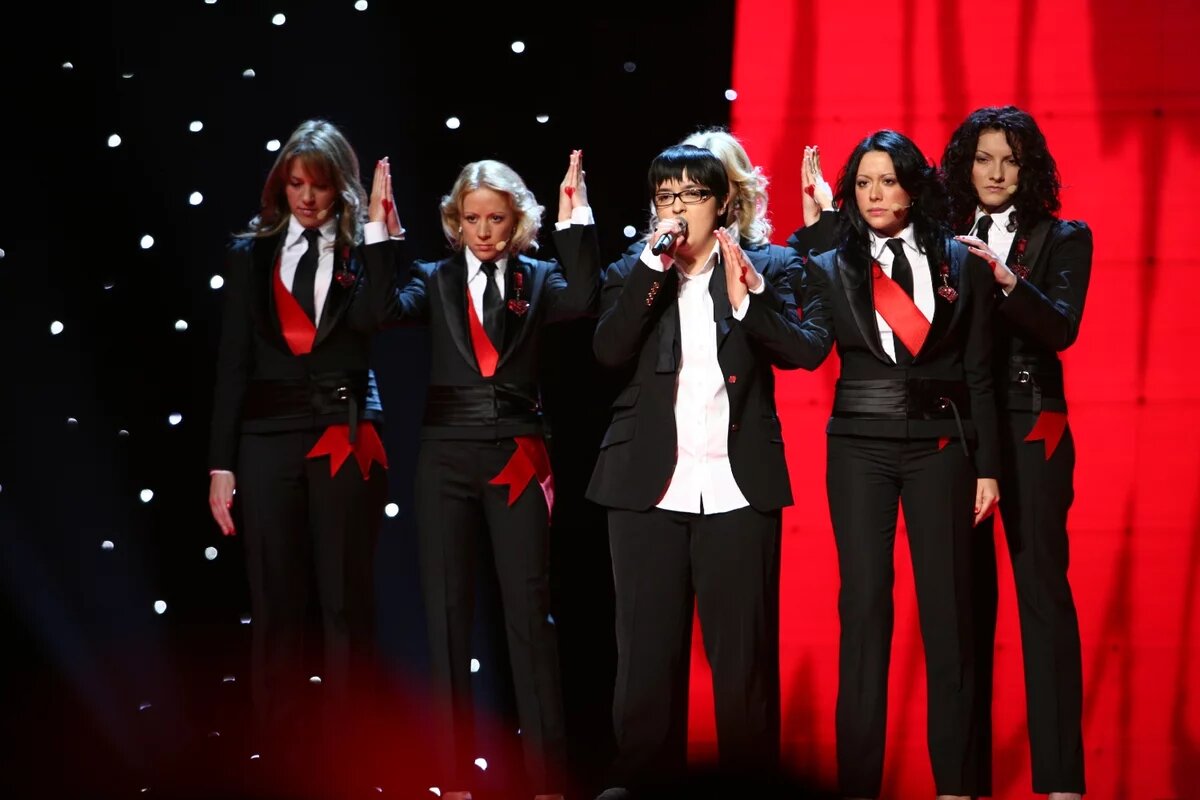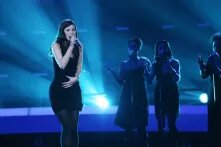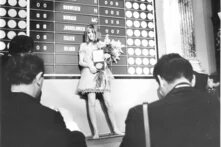The ESC usually stands for camp in the gay male tradition. Can it also be of interest to lesbians and feminists? On kitsch and camp as queer communication strategies.

The ESC – Only entertainment?
Writing about entertainment, as film scholar Richard Dyer observes, is often done through a series of negations, since it is not considered art, not serious, not refined (2002a, 6). Moreover, entertainment does not simply give people what they want – it actually defines those wants. Dyer also points out that the notion of queer(s) has tended to be associated with white, elite gay men. The traditions of working-class and non-white queer subcultures and lifestyles have been foundational for the development of queerness, yet they keep disappearing from view in dominant constructions of queerness (6).
Although Dyer emphasizes the centrality of culture (in the broadest sense) for the queer movement, culture itself cannot, as some may hope, change the world. It has, however, certain key functions to perform because the arts and popular culture express, define, and mold experiences and ideas, making them visible and available for wider audiences (2002a, 164).
Dyer sees four dominant concepts of the politics of culture: identity, knowledge, propaganda, and pleasure. The politics of culture is a subtle part of that more conscious process of making sense of the world, that process being the group’s production of knowledge about itself and its situation. Dyer cautions us that we must not flinch at the understanding of culture as propaganda because it is not exclusively simplistic. Rather, it means committed culture that recognizes its own committedness and enjoins audiences to share its commitment (2002a, 15–16).
The Eurovision Song Contest (ESC), founded in 1955 as a utopian dream of bringing post-WWII and eventually post-Soviet Europe together around some light entertainment, has become Europe’s most watched television program, with an audience of approximately 200 million viewers. Thanks to its enormous fanbase, the ESC is still going strong after more than half a century and even now seems relevant for its queer audiences. Nevertheless, it may seem strange that the ESC, a post-war European peace utopia and mainstream music event, is identified to such a degree as queer today. As one sympathetic towards the annual music television extravaganza, I wonder how far the ESC can take its queer audiences in a post-closet world. In the ESC, queer interaction and togetherness are based on a combination of kitsch and camp – an aesthetic style and sensibility that aficionados find appealing because of its ironic, over-the-top challenging of the norms of ‘good behavior’ and ‘good taste.’
Nonetheless, if the ESC is camp in a gay male tradition, the question remains whether it can be of interest to dykes and feminists? This essay, therefore, revisits the notions of kitsch and camp as queer communication strategies. It closes with a reflection on the contest’s arbitrary notions of Europe, its troubled geopolitics, and its radically extroverted playing with taste taboos as pleasurable entertainment.
The ESC can be viewed as committed culture that can be openly LGBTQ+, but does not have to be explicitly queer. While queer can be used as an umbrella term for LGBTQ+ culture, it also includes other non-straight and non-binary positions, pleasures, and readings that are not clearly marked as LGBTQ+. The point, as queer scholar Alexander Doty states, is that the most radical understanding of queer is queerness as something apart from established gender and sexuality categories (2000, 6–7). This is where the ESC finds such a broad base: because of its unique position in popular culture in general and queer culture in particular, the aesthetics of the ESC are a combination of kitsch and camp that appeals to a large audience, both queer and straight.
The ESC – Celebrating peace and unity in Europe
The ESC takes place annually in May (with the exception of May 2020). This scheduling was not a random choice. The aim was for the contest to coincide with Europe Day, a celebration of European peace and unity on May 9, based in turn on the 1950 Schuman Declaration emphasizing European cooperation and solidarity. As cultural theorist Johan Fornäs points out, May is metaphorically associated with “awakening after a frozen winter symbolizing a political resurrection after years of divisive wars” (2017, 190).
The ESC is a useful prism through which to examine contemporary European debates about sexual politics.
The ESC rules explicitly state that “No lyrics, speeches, gestures of a political or similar nature shall be permitted during the ESC”. However, encoding political messages into songs is what the contest has always been about (Carniel 2015, 136). Therefore, the ESC has been politically charged since its inception. A mix of sexual politics, geopolitics, and ethno-religious sympathies, it provides literal and figurative access to an ideal of post-war, modern European society that is “democratic, capitalist, peace-loving, multicultural, sexually liberated, and technologically advanced” (Raykoff and Tobin 2007, xviii).
I agree with Carniel who finds the ESC a useful prism through which to examine contemporary European debates about sexual politics, as well as the contest’s role in defining the borders of modern Europe and its conditions of belonging (2015, 136). The symbolic coming out of the ESC took place with Dana International’s winning performance, “Diva,” in 1998. Prior to this, Eurovision’s gay appeal, while present, was considered closeted (141). Other out-performances, such as those of Marija Šerifović (“Molitva,” Serbia, 2007), Verka Serduchka (“Dancing Lasha Tumbai,” Ukraine, 2007), and Conchita Wurst (“Rise Like a Phoenix,” Austria, 2014), have been widely celebrated by media and audiences. As queer scholar Heiko Motschenbacher has stated, their presence at the ESC has led to greater queer visibility, in its turn facilitating a gradual integration of queers into the European mainstream (2016, 33; Ziv 2007).
The ESC: “Love, love, peace, peace”
The ESC is a sublime, contradictory mix of musical entertainment and shameless kitsch.
In the ESC everything is possible – from spectacular performances by glittering divas, bearded drag queens, and Australian pop-opera singers, to vocal balancing acts in Montenegrin pop-folklore performances and lovesick Italo-pop songs from San Marino. The whole spectacle is a sublime, contradictory mix of musical entertainment and shameless kitsch. With the expansion of (mainly) popular culture, the former hierarchization of low and high art has been replaced by aesthetic pluralism and a (mostly) peaceful coexistence among different aesthetic styles, with no single form having an exclusive and binding claim to hegemony or normative validity. The fans of the ESC love the event, while the more critical viewers might be stuck in a love–hate relationship to it. The ESC can be fun and joyful, but it can also be the opposite, and an audience can be simultaneously drawn to it and offended by it.
Camp politics of the ESC
Although kitsch is the aesthetic cornerstone of the ESC, it is only a part of camp aesthetics within the system of queer communication. Like kitsch, the term camp is also difficult to translate into another language, but the phenomenon itself exists globally. At the beginning of the twentieth century, camp gained currency in the slang of theatricals, high society, the fashion world, showbusiness, and urban subcultures, and in the 1920s it also emerged as a literary style reminiscent of Oscar Wilde, with its aura of “aestheticism, aristocratic detachment, irony, theatrical frivolity, parody, effeminacy, and sexual transgression”. For Newton, camp was not so much the queerness of perceiving audiences and performing subjects, but rather the cohesive effect of the theatrical self-representation of a stigmatized self (203).
Although kitsch and camp today fit into various sub- and pop cultural contexts, a distinction can still be made between taking an ironic distance to it, and the embrace of the ‘naïve’ kitsch consumer (Broch’s term) who whole-heartedly enjoys kitsch. It is a relevant question whether straight spectators are, in fact, always naïve kitsch consumers, while queer and camp-competent audiences see something else in the ESC. Drawing such generalizing conclusions is difficult in the absence of empirical evidence, but what can be said is that kitsch in the service of camp aesthetics requires queer cultural competence that can only be obtained from queer culture.
The great dyke rewrite of camp
The camp style of the ESC is generally characterized by white homonormativity, thanks to camp’s reliance on partially reactionary and misogynistic images. This leads one to wonder whether out-LGBTQ+ identities can be analyzed together. As queer scholar Jack Halberstam observes, in terms of queer historiography and queer biography, it might be pointless to study lesbians and gay men as a group. Although there are similarities, their gendered histories differ in many relevant aspects. With regard to dykes and transgender people, similarities can be found in gender variation, although once again Halberstam claims that their respective histories are different (2005, 62–70). Notwithstanding, as philosopher Judith Butler and theatre scholar Sue-Ellen Case have claimed, queerness is ultimately something beyond gender: it is an attitude, a way of responding and objecting to gender binarism (Butler 1991, 13–31; Case 1989, 282–299, also in Cleto 1999, 91).
Queer media scholar Katrin Horn has also challenged the homonormative camp tradition of the ESC. She argues that camp’s new politics and pleasures also have post-closet dyke potential beyond gay men, making camp still relevant as a queer aesthetic and cultural category. In Women, Camp, and Popular Culture: Serious Excess (2017) she elaborates on the notion of lesbian camp, writing “A drag queen with a beard, surrounded by animated flames, who sings about the rise of the ostracized, and dedicates her victory to the vision of a pan-European gay rights movements, is not the opposite, but the epitome of camp” (2017, 3).
Camp has for a long time been seen as a gay male form (and norm) of irony and camp.
Horn also points out that not many gay men have seen the connection between Austria’s win, “Rise Like a Phoenix,” performed by Conchita Wurst in 2014, and the 2007 winner, Marija Šerifović – a butch lesbian in a loose tuxedo, dark glasses, and short hair, who belted out a dramatic ballad, “Molitva” (Prayer), in her native Serbian. Horn reads Marija Šerifović’s performance as lesbian camp, a discourse absent from ESC’s queer history: “Marija Šerifović was accompanied by a group of high-femme background singers clad in fitted, curve-accentuating tuxedos, high heels, and long hair, whose clasping hands, at the end, formed hearts connecting all the women on stage, including the butch-coded lead singer” (2017, 3, Vänskä 2007, 66–81).
This is an important point because camp has for a long time been seen as a gay male form (and norm) of irony and camp. Entries by Conchita Wurst and Verka Serduchka have been interpreted as camp drag performances that theatrically evoked gender norms and heteronormativity, placing gender in quotation marks. Out-dyke performances such as Šerifović’s have remained invisible in the ESC camp discourse.
Horn observes that two convergent cultural developments of the 1990s created an environment in which camp could finally materialize as a prominent strategy in films for dyke audiences. First, the proliferation of ‘lesbian chic’ in mainstream media, which influenced lesbian media consumption and representation, and consequently a willingness to engage in more playful ways with questions of gender and sexuality. Second, the success of New Queer Cinema, which paved the way for queer themes in feature films and a re-evaluation of intertextuality and camp aesthetics (37). According to Horn, these developments provided “both the access to and visibility in popular culture which have hitherto been claimed as lacking for lesbian subjects and thus precluded them from participating in camp discourses widely regarded as a male prerogative” (44).
B. Ruby Rich’s hope for ‘the Great Dyke Rewrite’ of popular culture has made it possible to modify mainstream genres offering a critical engagement with and intervention into the history of lesbian representation. By considering intertextual references and deconstructive practices in viewing more inclusive representations of queer women, Horn sees camp as a valuable concept that imagines queer communities through alternative media consumption as well as through disruptions within heteronormative frameworks (2017, 4). For Horn, the denaturalizing, parodic effect of camp’s stylistic excess adds a critical perspective and distance to popular culture. Thus, she claims, camp appears as a way of dealing with popular culture that goes beyond assimilation or opposition. Horn’s dyke rewrite of camp offers a solution to the problem of how queer women can participate in the mainstream media landscape without having to deny their identities (4).
Troubled geopolitics
Since the ESC is not just a vocal competition, but also and above all a clash of nations, it is by definition contested terrain. Therefore, geopolitics may always be a problem for the ESC, no matter how many queers participate in the contest and are included in its large fanbase.
“Eurovision offers queer audiences an important opportunity to experience belonging to Europe,” Carniel insists (2015, 152). However, the ESC’s definition of Europe is rather arbitrary, as it includes Israel and Australia as well as dictatorships such as Azerbaijan, which won the ESC in 2011 and, as is customary, hosted the contest the following year. Conchita Wurst, in dedicating her winning song, “Rise Like a Phoenix,” “to everyone who believes in a future of peace and freedom,” added that “we are united and we are unstoppable” (Baker 2015, 84). Nonetheless, the concept of the ESC as a queer peace project remains intertwined with troubled geopolitics.
Staying with the trouble
The death and disappearance of camp (and of the ESC for that matter) have been announced many times and the criticism has not all been about external threats, such as mainstreaming, but also, as Katrin Horn points out, addressed camp’s internal challenges.
Feminist scholars, such as Pamela Robertson (1996) to name one, have also reflected on the unblemished whiteness of camp, its class-related structures, and its feminist potential. Performance artist and queer studies scholar Kareem Khubchandani points out that many white queer scholars worry that camp is disappearing because it is a ‘gay way of knowing,’ and gays are rapidly becoming incorporated into the mainstream. He states that “new forms of camp by queer people of color, trans people, and immigrant LGBTQ+ folks are being born as we speak. Camp always emerges on the margins” (Kesslen 2019).
The ESC allows its queer audiences to sense the utopia, rather than to really own it.
Love it or hate it, the ESC is there every year. The ESC might not dissolve the distinction between ‘high’ and ‘low’ art, but it certainly challenges the more ascetic forms of the performing arts. Playing with taste taboos, the ESC still uses camp creatively. Perhaps, as Richard Dyer writes, the ESC as entertainment “presents, head-on as it were, what utopia would feel like, rather than how it would be organized. It thus works at the level of sensibility, by which I mean an affective code that is characteristic of, and largely specific to, a given mode of cultural production” (2002a, 20, italics mine). The pleasure that entertainment provides sometimes is (or rather feels) necessary: we are in this together, we are all here, and we all feel (Coffelt 2018, 7).
This is what performance does to an audience and it is where the ESC finds such a broad base: because of its unique position in popular culture in general and queer culture in particular, it appeals to a large audience, both queer and straight. Although the ESC as a peace project might be naïve, it can still be a good and pleasurable thing. However, as Allison Coffelt reminds us, the spell is broken when the audience awakens to what it really is (5). Similarly, the ESC allows its queer audiences to sense the utopia, rather than to really own it. I think that this is as far as the ESC can take us as camp entertainment. The rest is geopolitics and, as feminist scholar Donna Haraway would say, we need to stay with the trouble.
Tiina Rosenberg is Professor of Theatre and Performance Studies at Stockholm University. She is the former Vice-Chancellor of the University of the Arts Helsinki and has previously been a Professor of Gender Studies at Stockholm University and at Lund University. Rosenberg has written extensively on performing arts, feminism, and queer theory.
The original version of the article: "Rising Like the Eurovision Song Contest. On Kitsch, Camp, and Queer Culture" by Tiina Rosenberg was published by Foreningen Lambda Nordica 2/2020 under the CC BY-ND license.
REFERENCES
Baker, Catherine. 2015. “Gender and Geopolitics in the Eurovision Song Contest: Introduction.” Contemporary Southeastern Europe, 2(1): 74–93.
Broch, Hermann. 1955. “Einige Bemerkungen zum Problem des Kitsches.” In Dichten und Erkennen. Essays–Band I. Gesammelte Werke 6, 295–309. Zurich: Rhein Verlag.
Butler, Judith. 1991. “Imitation and Gender Insubordination.” In Inside/Out: Lesbian Theories, Gay Theories, edited by Diana Fuss and Michele Aina Barale, 13–31. New York: Routledge.
Carniel, Jessica. 2015. “Skirting the Issue: Finding Queer and Geopolitical Belonging at the Eurovision Song Contest.” Contemporary Southeastern Europe, 2(1): 136–154.
Coffelt, Alison. 2018. “Slippery Kitsch and the Aesthetics of Power.” Contemporary French and Francophone Studies. 21:5 (2017), 1–9.
Doty, Alexander. 2000. Flaming Classics. Queering the Film Canon. New York: Routledge.
Dyer, Richard. 2002a. “The Idea of Entertainment.” In Only Entertainment, 5–9. London & New York: Routledge.
Dyer, Richard. 2002a. “Entertainment and Utopia.” In Only Entertainment, 19–36. London & New York: Routledge.
Fornäs, Johan. 2017. “Euro-Visions: East European Narratives in Televised Popular Music.” In Europe Faces Europe, edited by Johan Fornas, 179–236. Bristol: Intellect.
Halberstam, Jack [Judith]. 2005. “Queer Studies.” In A Companion to Gender Studies,edited by Philomena Essed, David Theo Goldberg and Audrey Kobayashi, 62–70.New Jersey: Blackwell Publishing.
Horn, Katrin. 2017. Women, Camp, and Popular Culture Serious Excess. Cham: Springer International Publishing.
Kesslen, Ben. 2019. “What is ’camp’? This year’s elusive Met Gala Theme.” NBS News.
Motschenbacher, Heiko. 2016. Language, Normativity and Europeanisation. Discursive Evidence from the Eurovision Song Contest. London: Palgrave Macmillan.
Newton, Esther. 1972. Mother Camp. Female Impersonators in America. Chicago: The University of Chicago Press.
Raykoff, Ivan & Tobin, Robert D. 2007. A Song for Europe: Popular Music and Politics in the Eurovision Song Contest. Farnham: Ashgate
Rich, B. Ruby. 2013. New Queer Cinema: The Director’s Cut. Durham: Duke University Press.
Robertson, Pamela. 1999. “‘Mae West’s Maids: Race, ‘Authenticity’, and the Discourse of Camp.” In Camp. Queer Aesthetics and the Performing Subject: A Reader, edited by Fabio Cleto, 393–408. Ann Arbor: The University of Michigan Press.
Vänskä, Annamari. 2007. “Be Spectacular and Over the Top: On the Genealogy of Lesbian Camp.” SQS Journal, 2: 66–81.
Ziv, Amalia. 2007. “Diva Interventions: Dana International and Israeli Gender Culture.” In Queer Popular Culture: Literature, Media, Film, and Television, edited by Thomas Peele, 119–135. New York: Palgrave Macmillan.


